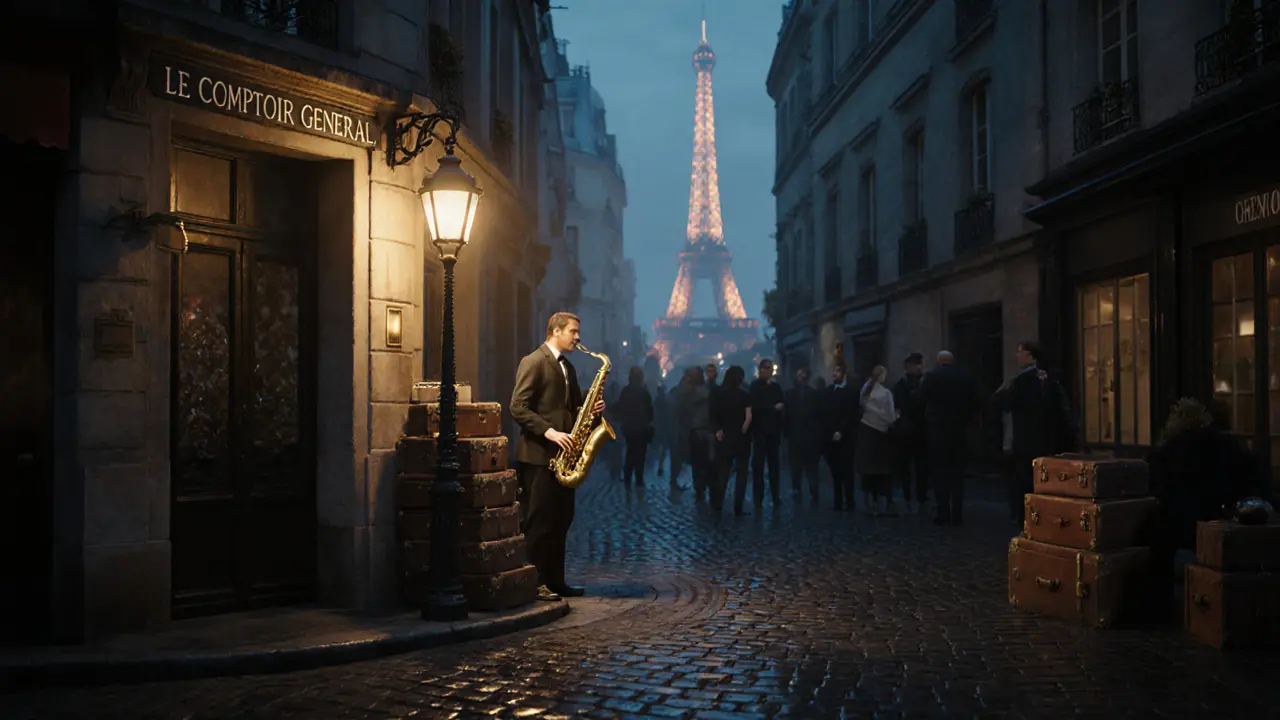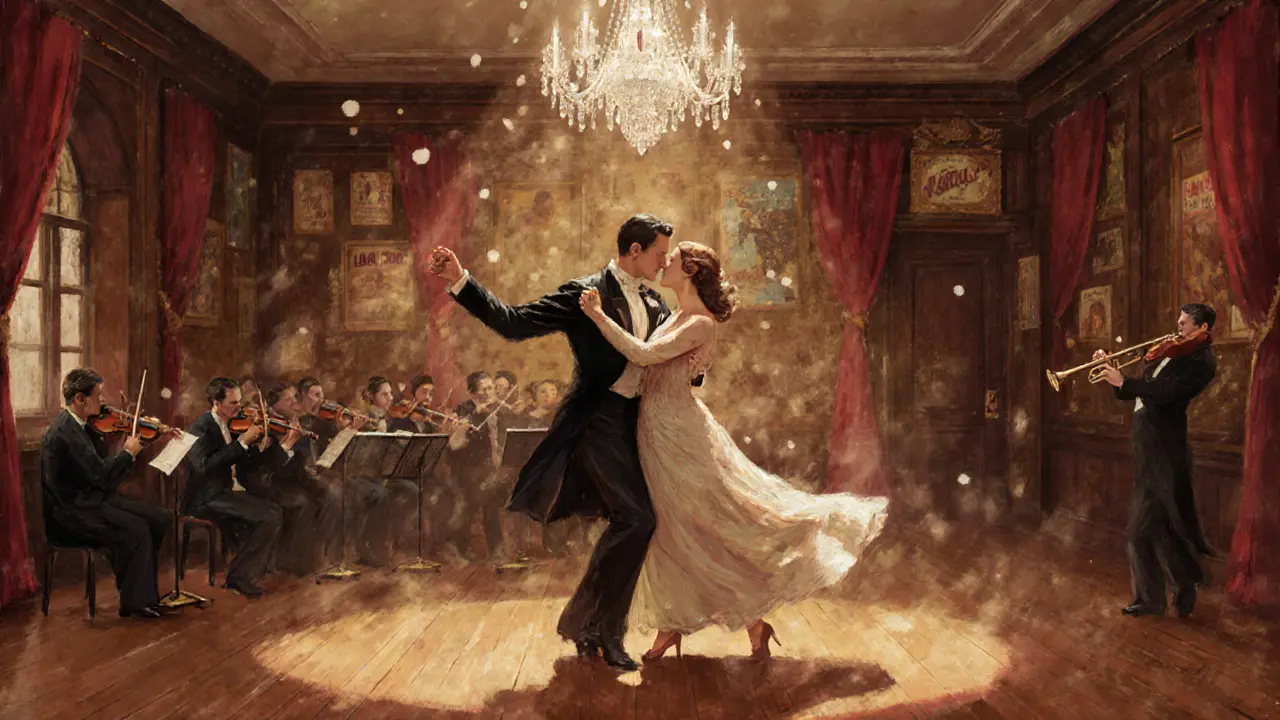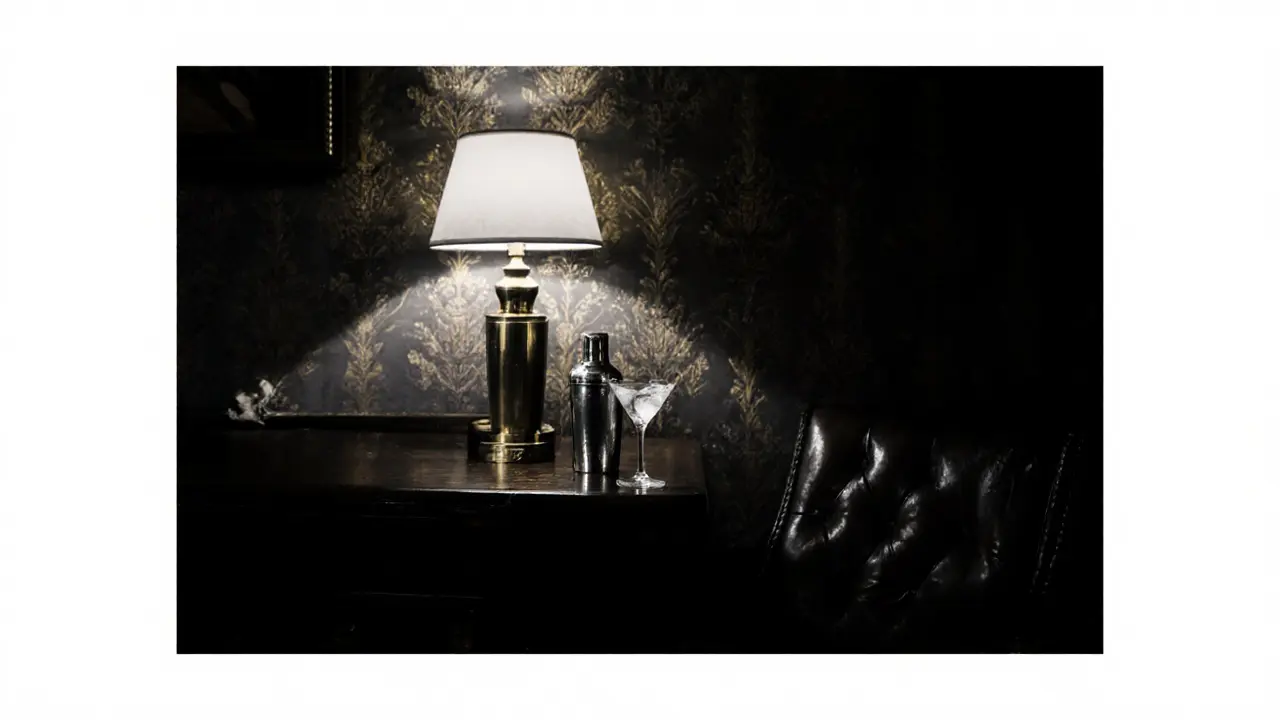
Paris doesn’t sleep when the sun goes down-it just changes outfits. By 9 p.m., the city sheds its daytime elegance and slips into something darker, louder, and more intimate. You won’t find neon signs blinking over every corner, but you’ll find hidden courtyards where jazz spills onto cobblestones, basement wine bars where sommeliers pour rare bottles to strangers who become friends, and rooftop terraces where the Eiffel Tower sparkles like a secret only locals know how to find.
Where the Locals Really Go After 10 p.m.
If you’re looking for the same clubs tourists flock to on Instagram, you’ll miss the real Paris. The best spots aren’t listed in guidebooks-they’re whispered about over coffee the next morning. In the 10th arrondissement, Le Comptoir Général feels like a forgotten attic full of vintage suitcases, mismatched chairs, and live Afrobeat that makes you forget you’re in Europe. No cover charge. No dress code. Just a barman who knows your name by the third drink.
Down in Belleville, La Java has been swinging since 1912. It’s not a club. It’s a living archive. On Friday nights, couples in vintage dresses waltz under chandeliers while a live orchestra plays 1930s French swing. The walls still bear the scratches from feet that danced here before your grandparents were born. No one here checks your ID. They just hand you a glass of red and nod toward the floor.
For something quieter, head to Bar des Phares near the Seine. It’s tiny. Only six stools. The owner, Jean-Luc, pours natural wines from small farms in the Loire Valley. He’ll tell you why the 2021 Gamay tastes like wet stones and blackberries. You won’t leave with a cocktail name you can’t pronounce. You’ll leave with a story.
The Art of the Late-Night Bistro
Parisians don’t eat dinner at 7 p.m. They eat it at 9:30. And they don’t stop there. Many of the city’s best late-night bites are tucked into unmarked doors in the 11th and 12th arrondissements. Le Baratin in the 20th is one of them. No website. No reservations. Just a handwritten menu on a chalkboard and a kitchen that stays open until 3 a.m. Their duck confit with crispy potatoes costs €18. It’s the kind of meal that makes you reconsider everything you thought you knew about French food.
At Le Chateaubriand, you don’t order from a menu. You get what the chef feels like making that night. It’s tasting menu only. €75. No tips. No service charge. Just a chef who moves between tables like a friend checking in. The food is bold-fermented cabbage with smoked eel, burnt honey with goat cheese. It’s not for everyone. But if you’ve ever wondered what French cuisine tastes like when it stops being polite, this is it.
Music That Doesn’t Need a Stage
Paris has more live music per square meter than any other city in Europe. But you won’t find it in arenas. You’ll find it in bookshops, laundromats, and old cinemas turned into jazz lounges. Le Petit Bain, a floating bar on the Seine, hosts underground DJs on weekends. The music is experimental-noise, glitch, post-punk. The crowd? Artists, students, translators who work nights. No one takes photos. No one posts. You just listen.
On Wednesday nights, Le Trianon turns into a jazz haunt for musicians who play in the daytime but come here to improvise. You’ll hear trumpet solos that stretch for ten minutes without repeating a note. The audience doesn’t clap between songs. They wait. Because in Paris, silence is part of the music.

Where to Find the Real Cocktail Scene
The cocktail bars in Paris aren’t about sugar and glitter. They’re about precision. Little Red Door in the 10th is ranked among the world’s top 50 bars. Their signature drink, The Last Word, uses house-infused gin, green chartreuse, and a single drop of orange blossom water. It costs €22. You’ll taste it once and remember it for years.
But the real magic happens at Bar Hemingway inside the Ritz. It’s expensive-€28 for a dry martini-but it’s the only place in Paris where you can sip a drink that Ernest Hemingway once ordered. The bartenders still use the same silver shaker from 1931. They don’t call it a museum. They call it work.
For something more rebellious, try Bar à Vin in the Marais. No cocktails. Just wine. But not the kind you find in supermarkets. They pour 80 different bottles by the glass, all from organic vineyards. The owner, Sophie, will ask you what mood you’re in. Then she’ll pick the wine. You’ll trust her. Because in Paris, wine isn’t a drink. It’s a conversation.
When the Clubs Open (And When They Close)
Parisian clubs don’t start at midnight. They start at 2 a.m. That’s when the real crowd arrives. Concrete in the 13th is a warehouse-turned-club with industrial ceilings and a sound system that vibrates your ribs. It’s not glamorous. It’s not Instagrammable. But it’s the only place in the city where you’ll hear techno played by artists from Senegal, Lebanon, and Brazil-all on the same night.
At La Cigale, you’ll find electro-pop and indie bands that never made it to the U.S. The crowd is young, loud, and full of energy. They don’t dance to look cool. They dance because they can’t help it.
And then there’s Le Baron. It’s the one place where celebrities show up. But even here, the vibe isn’t about fame. It’s about music. The DJ plays deep house until sunrise. The bar runs on cash only. And the door? It opens when the music feels right.

How to Navigate Paris After Dark
You don’t need a car. You don’t even need a map. The Metro runs 24/7 on weekends. Line 6 runs along the Seine and drops you near every major spot. A single ticket costs €2.10. A night pass (Mobilis) is €7.70 and covers all zones.
Don’t expect taxis to be easy to find after 2 a.m. Use Bolt or Uber-they’re cheaper and faster than hailing one on the street. But avoid the tourist traps near Champs-Élysées. They’ll charge you double.
Paris is safe after dark, but not because it’s empty. It’s safe because people are out. Walk with purpose. Don’t look lost. Smile at the bouncer at the door. Say bonsoir when you enter. You’ll be treated like family.
What Not to Do
Don’t ask for a “gin and tonic” at a wine bar. They’ll give you one-but they’ll look at you like you asked for ketchup on crème brûlée. Don’t try to take photos of the Eiffel Tower at night. It’s illegal. The light show is copyrighted. You can watch it. You can’t record it.
Don’t wear sneakers to a jazz club. Not because it’s forbidden-but because it’s rude. Parisians dress for the mood. A leather jacket. A scarf. A pair of boots. That’s enough.
And don’t rush. Paris after dark isn’t about checking off places. It’s about letting the night unfold. Sit at a table. Order another drink. Let the conversation drift. That’s when you’ll find the real Paris.
Is Paris nightlife safe for solo travelers?
Yes, Paris is generally safe for solo travelers at night, especially in well-lit, popular areas like Le Marais, Saint-Germain-des-Prés, and the 10th and 11th arrondissements. Stick to busy streets, avoid isolated parks after midnight, and trust your instincts. Most locals are friendly and will help if you look unsure. The Metro runs all night on weekends, making it easy to get home safely.
What’s the best night of the week for nightlife in Paris?
Friday and Saturday nights are the busiest, but Wednesday and Thursday are where the real magic happens. Many jazz clubs, underground bars, and experimental music venues have their best shows midweek when the crowds are smaller and the vibe is more intimate. If you want to avoid lines and feel like a local, go midweek.
Do I need to make reservations for Paris bars and clubs?
For most casual bars and wine spots-no. But for popular cocktail bars like Little Red Door or Le Comptoir Général, it’s smart to book ahead, especially on weekends. For clubs like Concrete or Le Baron, you usually don’t need a reservation, but arriving before 2 a.m. helps avoid long lines. Always check their Instagram or website for updates-many places change their schedule last minute.
Are there any free nightlife options in Paris?
Absolutely. Many jazz sessions in the 14th and 15th arrondissements are free, especially in small churches or cultural centers. The Seine banks come alive at night with street performers, poets, and musicians-no cover, no pressure. On summer nights, the city hosts open-air film screenings and music events in parks like Parc de la Villette. Just show up with a blanket and a bottle of wine.
What time do most places close in Paris?
Bars close between 2 a.m. and 4 a.m., depending on the neighborhood. Clubs often stay open until 5 or 6 a.m., especially on weekends. Some late-night bistros, like Le Baratin, serve food until 3 a.m. The Metro stops running around 1:15 a.m. on weekdays and 2:15 a.m. on weekends. After that, you’ll need a taxi or rideshare.
If you want to remember Paris after dark, don’t just take pictures. Talk to the bartender. Ask the jazz musician where he learned to play. Let someone guide you to a hidden courtyard you’d never find alone. That’s how you leave with more than a memory-you leave with a piece of the city.

Write a comment